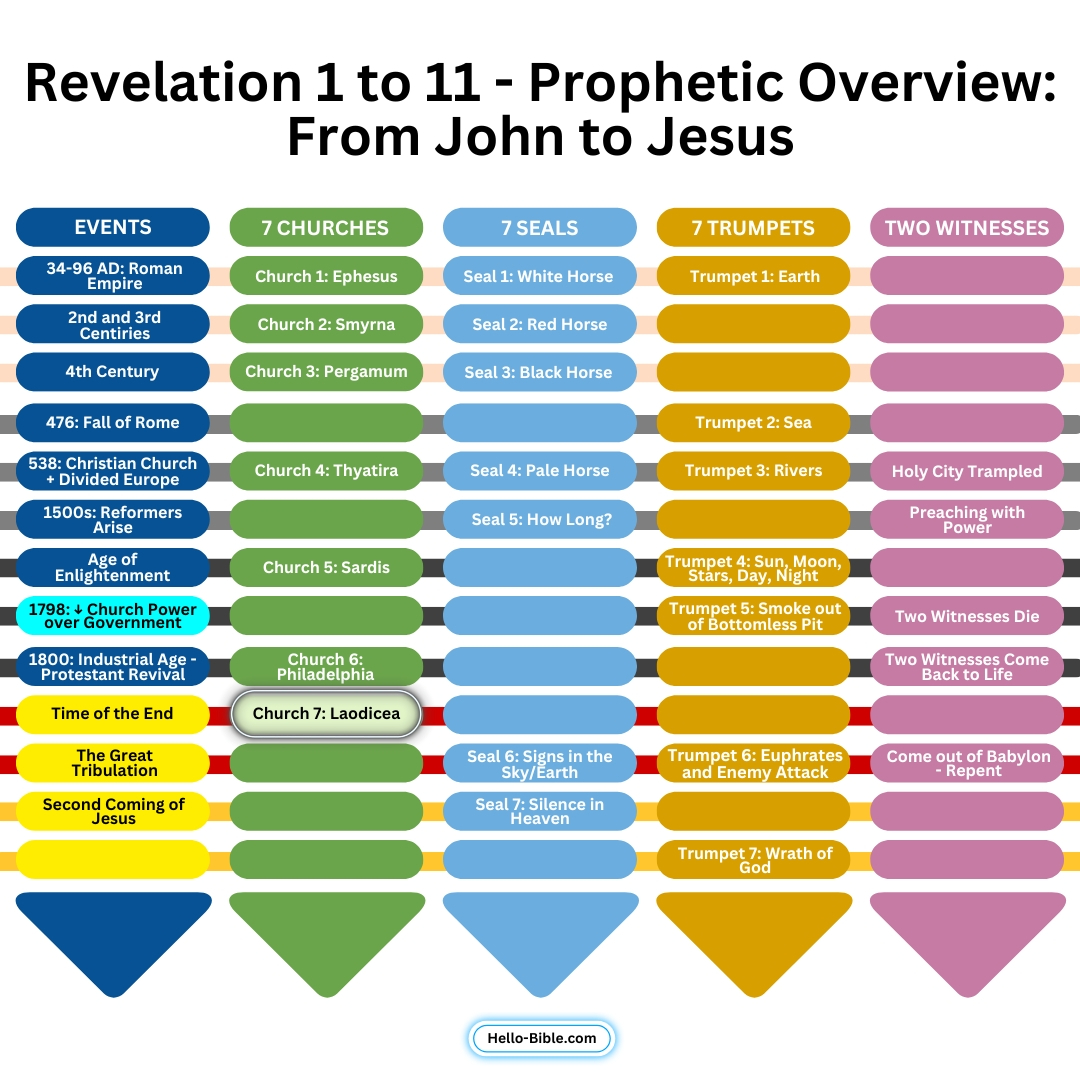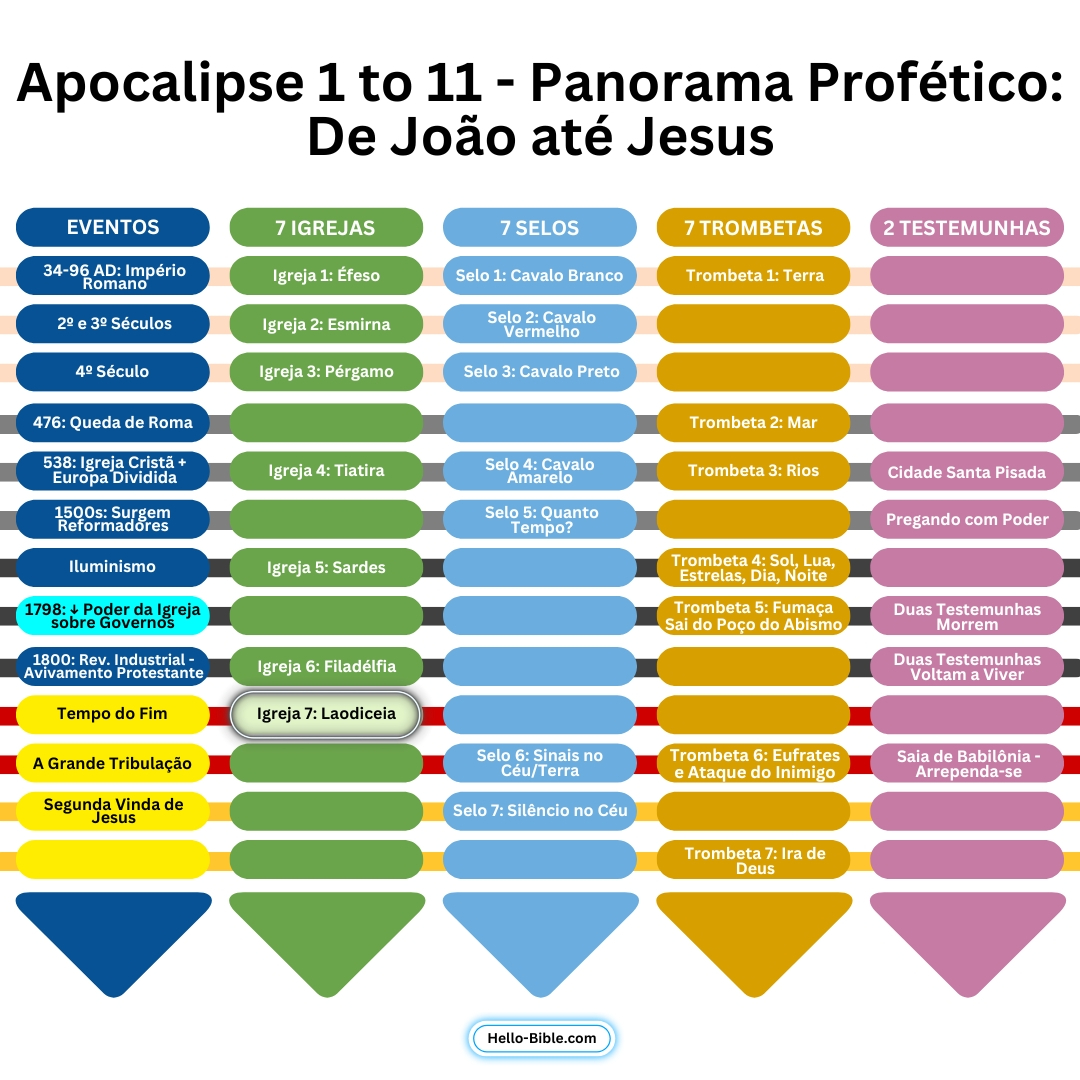14 And unto the angel of the church of the Laodiceans write; These things says the Amen, the faithful and true witness, the beginning of the creation of God;
15 I know your works, that you are neither cold nor hot: I would that you were cold or hot.
16 So then because you are lukewarm, and neither cold nor hot, I will spew you out of my mouth.
17 Because you say, I am rich, and increased with goods, and have need of nothing; and know not that you are wretched, and miserable, and poor, and blind, and naked:
18 I counsel you to buy of me gold tried in the fire, that you may be rich; and white clothing, that you may be clothed, and that the shame of your nakedness does not appear; and anoint your eyes with eye salve, that you may see.
19 As many as I love, I rebuke and chasten: be zealous therefore, and repent.
20 Behold, I stand at the door, and knock: if any man hears my voice, and opens the door, I will come in to him, and will eat with him, and he with me.
21 To him that overcomes will I grant to sit with me in my throne, even as I also overcame, and sat down with my Father in his throne.
22 He that has an ear, let him hear what the Spirit says unto the churches.
Drawing Connections
We are coming to our last study on the seven churches. Laodicea is the last stop on the route, and as we saw in Part 1 of this study, the church there had a serious problem of self-sufficiency. There was no room for God, and Jesus was found outside a locked door. In our last study, we covered the historical and biblical views of the city and of the church. In this final study, we will explore the details of the formatted letter and see the prophetic application of this message.
Part 1 Part 2
PART 2
Closer Look
*** Recipient -> “To the Angel of the Church in Laodicea” ***: Once again, the letter is addressed to the leader of the church, but applicable to all the members. Please see the comments in study #9, #12, and #14.
*** Sender -> “the Amen, the faithful and true witness, the beginning of the creation of God” ***: Jesus introduced Himself to this church in three ways: 1) the Amen; 2) the faithful and true witness; and 3) the beginning of the creation of God. The word 'Amen' actually comes from the Hebrew through the Greek word 'amēn', and means ‘in truth’. It is an expression that confirms that a statement is the absolute truth. We see Jesus using this expression many times. He would often start a sentence by using the word 'amēn', translated as “Verily I say” (Matthew 5:18; Matthew 5:26; Matthew 6:2; Matthew 6:5; Matthew 6:16 - just to mention a few). As we saw in lesson #5, Jesus is also the true witness, who testified unto death. He speaks the truth about Himself, and about the One who sent Him. He is also the beginning of God’s Creation. The word 'beginning' was translated from the Greek 'archē', which can also mean "origin", or "ruler". It carries the sense of priority, the starting point, and what comes first. Jesus has the dominion of absolutely everything since creation, because creation started with Him. He is the origin of creation itself (Colossians 1:15-16). In other words, Revelation 3:14 says: Jesus is the truth, He speaks the Truth, and He has everything under His control, because He is the Creator.
*** Assessment -> “I know…” ***: Since Jesus has control over everything, He knows the condition of the church in Laodicea.
- Works: the Laodiceans are neither cold nor hot, just like the city's water supply. The lukewarm water that arrived in Laodicea was only good for bathing. Not cold enough to be good for drinking, not hot enough to be used for medicinal purposes. Spiritually, the Laodiceans were just using the convenient portions of the Gospel. They were soaking away in a message that had its temperature adjusted to a more comfortable level. As they remained in their comfort zone, they never really stepped into the extremes of the water temperature. If they had experienced the extreme temperatures, they would have not been unaware of their lukewarm condition. The Laodiceans never got to continuously drink from the cold and refreshing Living Water, absorbing every word that proceeded from the mouth of God (Deuteronomy 8:3; Matthew 4:4). And they never applied the daily hot compress of truth over their sore and broken spirits (Luke 4:18). Revelation 3:16 says that the tepid Christians will be spat out of the body of Christ. True Christians are in fact called to follow an apparently inconvenient and uncomfortable path of extreme temperatures. Jesus said, deny yourself, take up your cross and follow Me (Matthew 16:24). But He also said that His yoke is easy and that His burden is light (Matthew 11:30). Carrying a cross is not an easy task, but it is made easier because Christ has already carried the burden of the final death for His people. All is left to do is to endure temporary earthly problems while we go on, being nourished and cared for by the One who is in control of the Universe.
- Indifference and self-sufficiency: The church members in Laodicea suffered from an acute case of lack of awareness. They had a completely distorted and delusional idea of who they were. Jesus warned them about this problem. The Laodiceans had the impression they were spiritually filled, spiritually rich, that they could see all the spiritual truths, and that they were righteously dressed. Even though they had access to the true Gospel message, they were actually filled with themselves, and therefore spiritually “wretched, and miserable, and poor, and blind, and naked” (verse 17). They were not getting their wealth straight from Jesus. They had substituted the rich message of God with a generic version. Their understanding of the scriptures was not protected with the eye drops of the Holy Spirit. And they thought they could dress themselves up with their own opinions and doctrines of convenience. Both in the material and in the religious sense, the church in Laodicea felt it had need of nothing (verse 17).
*** Appeal -> “I have what you need; repent by opening the door of your heart for Me” ***: The church was so blind, it could not even see its own wretched state. Jesus was calling them to repent, but they not only didn't think they needed to, but also didn't know how to do it. Jesus had to give them step by step instructions on how to repent. They needed to look to Jesus to get the truth that was refined by fire. They needed to let Him dress them with His white robes of righteousness, washed by the blood of His sacrifice. And they needed to let Jesus open their minds so they could see God’s will for them clearly. The way to get all these supplies from Him was to follow His simple instructions. Each person was being called to open the door of his or her heart so Self could go out, and Jesus could come in.
Jesus used an interesting word when He said people need to acquire the means to salvation from Him. He used the word “buy”. The word in Greek is agorazó, which means to buy in the marketplace, or purchase. Jesus’ statement seems strange, since we know the grace of God is a free gift to us (Romans 3:24; Romans 5:15; Romans 6:23). How are we to buy these things from Him? It is not hard to understand that He is the only source of those things. But how are we going to pay for them? And why do we need to purchase them? Could we not just receive them as a gift? The answer to those questions comes in verse 19 and 20. As Jesus had already pointed out, we have nothing to offer. We are miserable and devoid of righteousness. And that is why He says, in verse 19, that He is allowing to go through this process: because He loves us. He is calling His people to be zealous and repent. When true repentance happens, we naturally stop living the life we were living before. When we give Christ our old Self, we make room for all those goods Jesus is offering. Jesus is calling us to stop living a Self-centered life and start living a Christ-centered life.
*** Call to hear the Spirit -> The Spirit says to the churches ***: The message of “I am the only source of salvation, therefore repent and open your heart for me” was to be heard by all churches. There are no excuses not to hear this call. Please see the notes on study #14. Jesus is calling the church to become aware of its spiritual misery, poverty, blindness, and lack of righteousness.
*** Promise -> To the one who overcomes ***: The one who overcomes receives a very important promise:
- Sit with Jesus in His throne: When we think of a throne, the first thing that comes to mind is the picture of a western royal chair. The ancient Near East throne was not like that. It looked more like a couch than a chair. In any case, we can just trust Jesus’ word, and accept that there will be room there for the one who overcomes. The same way Jesus sat down with His Father when He overcame, we will also have our turn to sit with Him. Christ will elevate His people that much. Not because there is any merit in them. But because of His love for them. The fulfillment of this promise is seen in Revelation 20:4.
*** Church history view and prophetic application ***: Laodicea is the last church of the seven. This means that there will be no other prophetic period in the history of this world that will come after this one and before Christ’s Second Coming. The prophetic view of this church fits the period before Jesus returns. It represents God’s people living in the last days of this planet. Like no other time in history, the people in the last days are being bombarded with a culture that elevates Self: “solutions to problems can be found in yourself”; “believe in yourself”; “pick yourself up, and press on”; “you can do it”. At the same time, Christ is being leveled down and pushed out of the scene. Acting this way, society thinks it will be able to accommodate cultural diversity, and remain politically correct. The philosophies in the world today seem very good, and seem to be concerned with the welfare of a globalized civilization. But we must not be tricked. Colossians 2:8 says: “Beware lest any man spoil you through philosophy and vain deceit, after the tradition of men, after the rudiments of the world, and not after Christ." The challenges Christians face today are different than the ones in the previous prophetic times. It is much harder to overcome a problem you don’t even know you have. Just as with the 1st century church in Laodicea, Christ is calling us today, His end-time church, to come to Him and let Him show us what we really need.

© Hello-Bible - 2024

© Hello-Bible - 2024
Overview
Once again, we see contrasting realities being addressed in this letter. But this time around, the contrast is not between the world and the church. It is between the idea the church has of itself and the opinion Christ has of the church. Those two concepts are completely opposite from each other. Jesus did not point out the division in the church. He did not point out any heretic groups, or any specific sin that is prevalent among the members. There were no words mentioned about persecution. That doesn’t mean those things weren’t there. Christ’s approach shows His priorities when it comes to the salvation of a group who is unaware of its own wretched condition. There can be no doubt about how these people will be saved. There is no way they can be saved by any of their good deeds, or by their own merit. They have none. It is only through the grace of God that we can be saved. Only by accepting His white garment of salvation, we can present ourselves before God, as complete and pure beings, worthy to sit with Jesus in His throne. The gift of salvation is free in the sense that there is nothing we can do to add to Christ’s perfect offer. But in order to receive this free gift, we need to make a choice: to overcome the world, or to give in to it. We can either hand over to Jesus the nothingness that we are, and receive everything in return; or we can keep our belief in our own self, hold on to the thought we can have things done our way, but miss out on all the promises Jesus made to the one who overcomes. We live today in the prophetic period of Laodicea. We are this church. But we also are the object of Christ’s infinite love. There is hope, and He is just waiting for us to open our heart and let Him in.
Summary of the Seven Churches
Message to the literal churches in the 1st century, with prophetic application extending to the entire lifespan of the Church, from the 1st century until the time around the Second Coming of Jesus.
*** 1st Church - Ephesus: The church was beginning to lose its first, pure love for Jesus, yet it continued to reject false doctrines. Those who overcome are promised to eat from the Tree of Life, symbolizing their spiritual nourishment and sustenance through Jesus' power, leading to eternal life.
*** 2nd Church - Smyrna: This church endured great tribulation and poverty but was rich in the truth of God. Those who overcome are promised not to experience the second death but will receive the crown of life, meaning they will endure the temporary first death while awaiting the resurrection of the faithful. The second death is the eternal death reserved for those who did not choose life in Jesus.
*** 3rd Church - Pergamum: Although most members held fast to the truth, some had begun to introduce false doctrines into the church. Those who overcome are promised to eat of the hidden manna and receive a white stone with a secret new name, symbolizing their reception of Jesus, the Truth, and their new identity through His redemptive work on the cross.
*** 4th Church - Thyatira: This church was divided between those who remained faithful and those who engaged in sinful practices and followed satanic doctrines that had infiltrated the church. Those who overcome are promised power over the nations and the morning star, indicating that they will rule with Christ and receive the light of Jesus Himself at His Second Coming.
*** 5th Church - Sardis: This was a dead church, only going through the motions of Christian practice and partially following Scripture. Those who overcome are promised to be clothed in white, have their names remain in the Book of Life, and have their names confessed before the Father and the angels, symbolizing their celebrated entrance into God’s Kingdom, fully renewed by Jesus' merits.
*** 6th Church - Philadelphia: While some were still following false teachings, the focus is on the faithful who will be spared from the hour of temptation that will come upon the unfaithful. Those who overcome are promised to become an eternal pillar in God’s temple and to bear an inscription with the name of God, His city (New Jerusalem), and Jesus’ new name, indicating their permanent heavenly destination and their reflection of God's character.
*** 7th Church - Laodicea: This was a lukewarm, self-absorbed, and self-sufficient church that believed it needed no external help for salvation. Jesus is outside, knocking at a closed door, inviting them to share in the meal of His Truth, but their theology of Self keeps them in their comfort zone. Those who overcome are promised to sit with Jesus on God’s throne, sharing in Christ’s victory through His sacrifice, being made worthy by His grace.
